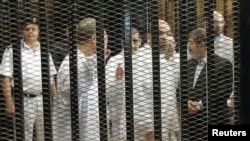CAIRO —
Deposed Egyptian president Mohamed Morsi is to stand trial for insulting the judiciary alongside 24 liberal politicians who opposed his Islamist rule but have similarly fallen foul of the army-backed rulers, judicial sources said on Sunday.
It is the fourth case brought against Morsi since he was ousted by the army last year, after a year in power, following mass protests against his rule.
But it also points to the growing pressure faced by the secular-minded politicians who helped to topple Hosni Mubarak in 2011, and have criticized both Morsi's Muslim Brotherhood when it was in power and the new military-backed order.
The non-Islamists charged in the case include former members of parliament Amr Hamzawy and Mostafa El Naggar, as well as Alaa Abdel Fattah, an activist blogger detained since November and already facing trial on charges of protesting without permission.
The charge of insulting the judiciary carries a jail term of up to three years.
Morsi has already been charged with inciting violence and conspiring with foreign militants against Egypt.
Egypt's army-backed interim government has waged a determined campaign of suppression against the Brotherhood, which it has labeled a terrorist organization. The security forces killed hundreds of its supporters in the weeks after Morsi was overthrown, and arrested thousands more.
The Brotherhood, once Egypt's best-organized political and religious movement, which won five consecutive elections, denies any links to violence and accuses the army of staging a coup.
Morsi is next due in court on Jan. 28, when he goes on trial on charges related to a mass jailbreak in 2011.
The interim government is pushing ahead with a political transition plan that should lead to presidential and parliamentary elections this year, with army chief General Abdel Fattah al-Sisi seen as a likely candidate.
Egyptians passed a new constitution in a referendum last week with a 98.1 percent “yes” vote, according to official results. The vote was boycotted by the Brotherhood.
It is the fourth case brought against Morsi since he was ousted by the army last year, after a year in power, following mass protests against his rule.
But it also points to the growing pressure faced by the secular-minded politicians who helped to topple Hosni Mubarak in 2011, and have criticized both Morsi's Muslim Brotherhood when it was in power and the new military-backed order.
The non-Islamists charged in the case include former members of parliament Amr Hamzawy and Mostafa El Naggar, as well as Alaa Abdel Fattah, an activist blogger detained since November and already facing trial on charges of protesting without permission.
The charge of insulting the judiciary carries a jail term of up to three years.
Morsi has already been charged with inciting violence and conspiring with foreign militants against Egypt.
Egypt's army-backed interim government has waged a determined campaign of suppression against the Brotherhood, which it has labeled a terrorist organization. The security forces killed hundreds of its supporters in the weeks after Morsi was overthrown, and arrested thousands more.
The Brotherhood, once Egypt's best-organized political and religious movement, which won five consecutive elections, denies any links to violence and accuses the army of staging a coup.
Morsi is next due in court on Jan. 28, when he goes on trial on charges related to a mass jailbreak in 2011.
The interim government is pushing ahead with a political transition plan that should lead to presidential and parliamentary elections this year, with army chief General Abdel Fattah al-Sisi seen as a likely candidate.
Egyptians passed a new constitution in a referendum last week with a 98.1 percent “yes” vote, according to official results. The vote was boycotted by the Brotherhood.





